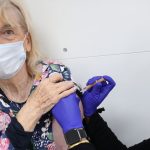Health secretary Sajid Javid warned that infections could rise to more than 100,000 cases a day in August after the UK relaxes COVID restrictions.
However Professor Neil Ferguson, an epidemiologist from Imperial College London who sits on the government’s New and Emerging Respiratory Virus Threats Advisory Group (Nervtag), says daily coronavirus numbers could be as high as 200,000.
This would be a new record for the UK. The previous peak was in early January when the UK registered nearly 70,000 cases and 1,325 deaths in a day.
So, why is the government willing to risk another wave by lifting almost all coronavirus rules on 19 July?
The primary reason is that the UK is no longer experiencing the same surge in hospitalisations and deaths as case numbers rise again.
The same number of days into the second wave in early 2021, despite similar infection levels, hospitalisations were more than double the current numbers. The daily number of COVID-related deaths was around 10 times higher.
Health Secretary Sajid Javid told Sky News: “What we are seeing is with rising case numbers – and yesterday I said we could see a doubling of case numbers by the time we get to 19 July – we are not seeing a corresponding increase in hospitalisations and death numbers.”
But chief scientific adviser Sir Patrick Vallance said that while “it’s a weakened link, not a completely broken link” and warned that hospitalisations will rise in the coming months.
Even if a much smaller percentage of infections result in severe illness or death, with high enough case numbers this could still put the NHS under considerable pressure in some areas of the country.
In England, case rates are currently highest in the North East and North West, where some areas have more than 600 daily cases per 100,000 people.
The hope is that a combination of warm weather and school holidays will help to keep these numbers down.
Another important factor behind the decision to press ahead with lifting restrictions has been the UK’s rapid vaccine rollout.
Professor Sir Mark Walport, former government chief scientific adviser, told Sky News: “The reason it’s become possible for ministers to make this decision is because the vaccine programme has become so very successful and has weakened, but certainly not broken, the link between infection and the most serious consequences of disease.”
As of 4 July, over 85% of the UK adult population had received at least one dose of the jab.
But a third of adults are not yet fully vaccinated and even those who are can still catch the virus. Experts are particularly concerned about how these conditions may lead to the creation of a new more resistant variant.
Steve Paterson, professor of genetics at the University of Liverpool, said: “The concern to me is that you now have a lot of single-vaccinated people with some but incomplete immunity.
“Evolving to this partial immunity is easier than the virus having to evolve to the high levels of immunity from complete vaccination; indeed, this may give a stepping stone to that.”
The Data and Forensics team is a multi-skilled unit dedicated to providing transparent journalism from Sky News. We gather, analyse and visualise data to tell data-driven stories. We combine traditional reporting skills with advanced analysis of satellite images, social media and other open source information. Through multimedia storytelling we aim to better explain the world while also showing how our journalism is done.






















